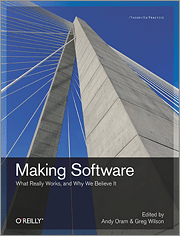Sebastopol, CA—Many claims are made about how certain tools, technologies, and practices improve software development. But which claims are verifiable, and which are merely wishful thinking? In Making Software: What Really Works, and Why We Believe It (O'Reilly Media, $44.99 USD), leading thinkers such as Steve McConnell, Barry Boehm, and Barbara Kitchenham offer essays that uncover the truth and unmask myths commonly held among the software development community. Their insights may surprise you.
- Are some programmers really ten times more productive than others?
- Does writing tests first help you develop better code faster?
- Can code metrics predict the number of bugs in a piece of software?
- Do design patterns actually make better software?
- What effect does personality have on pair programming?
- What matters more: how far apart people are geographically, or how far apart they are in the org chart?
Advance Praise
"We call ourselves "engineers," but programming processes are mostly dictated by comfort and momentum instead of being driven by data. With this wealth of empirical data about writing code, finally our processes can be as scientific as our personalities."
—Jason Cohen, founder, Smart Bear and founder, WPEngine
For a review copy or more information please email peyton@oreilly.com. Please include your delivery address and contact information.
Additional Resources
For more information about the book, including table of contents, index, author bios, and cover graphic, see: http://oreilly.com/catalog/9780596808310

|
Making Software Publisher: O'Reilly Media Andy Oram, Greg Wilson ISBN: 9780596808327, 624 pages Print Price: $44.99 Ebook Price: $35.99 order@oreilly.com 1-800-998-9938 1-707-827-7000 |
About O’Reilly
O’Reilly Media spreads the knowledge of innovators through its books, online services, magazines, and conferences. Since 1978, O’Reilly Media has been a chronicler and catalyst of cutting-edge development, homing in on the technology trends that really matter and spurring their adoption by amplifying “faint signals” from the alpha geeks who are creating the future. An active participant in the technology community, the company has a long history of advocacy, meme-making, and evangelism.
